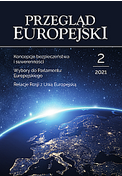Umowa o handlu i współpracy między UE a Wielką Brytanią
The Trade and Cooperation Agreement between the EU and the United Kingdom
Author(s): Jaroslaw KunderaSubject(s): Labor relations, Economic policy, Government/Political systems, International relations/trade, Political behavior, Political economy, EU-Approach / EU-Accession / EU-Development
Published by: Wydawnictwa Uniwersytetu Warszawskiego
Keywords: Brexit; Free Trade Area; Trade and Cooperation Agreement; European Union; United Kingdom;
Summary/Abstract: The Trade and Cooperation Agreement between the European Union (EU) and the United Kingdom (UK) is a free trade agreement signed in accordance with WTO rules. It consists of seven parts and many annexes, which contain provisions on the free movement of goods, investments, payments, rules of origin, common institutions, dispute resolution procedure, cooperation in the field of transport, environmental protection, combating terrorism and crime. In view of the UK’s exit from the EU, it is important to analyse, what is most interesting in the Agreement and what it does not contain, e.g. provisions on the free movement of workers, students, financial services, the right of citizens to work, the common trade, agricultural policy, regional policy, financing of the EU budget. Because the Agreement limits the existing freedoms and scope of mutual cooperation, the aim of this article is to analyse not only its provisions, but also the consequences that it will bring in terms of benefits and costs for the UK and the EU. The author uses a well-known non-Europe methodology in his research, taking into account the fact that things, which are now benefits of integration, could prove to be the costs of disintegration tomorrow. The costs and benefits of the Agreement should be assessed through the lens of the current costs and benefits of the UK’s membership in the EU. From this point of view, the implementation of the Agreement will bring higher alternative costs in the form of lower trade in goods and services, capital migration and workers in comparison with their volume, that can be achieved in the EU. The conducted analysis demonstrates that these costs will not be compensated by the savings from the UK contribution to the EU budget.
Journal: Przegląd Europejski
- Issue Year: 2021
- Issue No: 2
- Page Range: 107-126
- Page Count: 20
- Language: Polish

